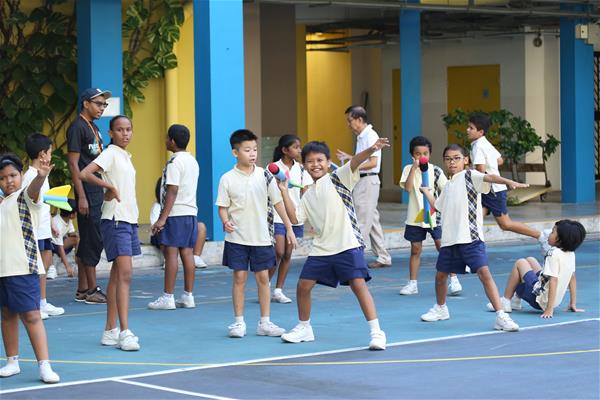Camp dynamics, which typically include being away from home, befriending peers, working in groups and trying new activities, are all learning opportunities. Even if the campers themselves do not realise it, learning is still taking place. Here are some learning opportunities which students get:
A chance to mingle
Camps present a chance for students to get to know peers who come from different backgrounds. This allows them to learn to socialise with a diverse network of peers, and understand the importance of tolerance and empathy.
For Secondary 3 student Sophia Rose Meyers, building friendships with peers from another school during their combined Outward Bound Singapore (OBS) camp was a memorable experience. “Initially, I didn’t think that I could make new friends from Whitley Secondary School. They came from different backgrounds, but we put that all aside and we became friends and bonded together,” says the Tanjong Katong Girls’ School student.
Nurturing independence
During camps, students have limited contact with their families and helpers. This pushes them to take responsibility and ownership of their lives.
Since the students are on their own, they would be required to solve their day-to-day problems without adult intervention. They would have to learn to manage possible conflicts with their group mates, or hiccups in activities.
Whitley Secondary School student Gagandeep Singh remembers being stuck in a communication barrier with his team mates in the first days of his Outward Bound Singapore (OBS) camp. “It was initially difficult to communicate as we were all shy and afraid to talk,” the Secondary 3 student recounts. “Slowly, we showed fellow team members how we could help each other at camp activities, and it helped to create trust among us.”
Venturing beyond their comfort zone
Camp instructors often guide students to take part in games and activities which many have not tried before, such as rock-climbing and kayaking. It encourages students to venture beyond their comfort zone and attempt something new.
Attempting a new activity may not always be easy, especially when it involves having to overcome a phobia. The group dynamics in camp activities present an opportunity for students to be empathetic and encourage one another to be resilient and not give up.
For Sophia, she had to overcome her fear of heights when one of the camp activities required her to scale a vertical wall. “I was very scared, but with encouragement from friends and camp instructors, I managed to scale the wall!” she shares. “At that time, I felt that if I could overcome my fear, the sense of accomplishment I would feel once I reach the top of the wall would be amazing. My friends and camp instructors supported me and said I could do it, and I really felt that I could.”
From 2018, all Secondary 3 students will get to participate in at least one Outward Bound Singapore camp. Through such activities, students will not just gain knowledge on surviving outdoors. They would also pick up soft skills which they can apply in their daily lives.




.jpg)

